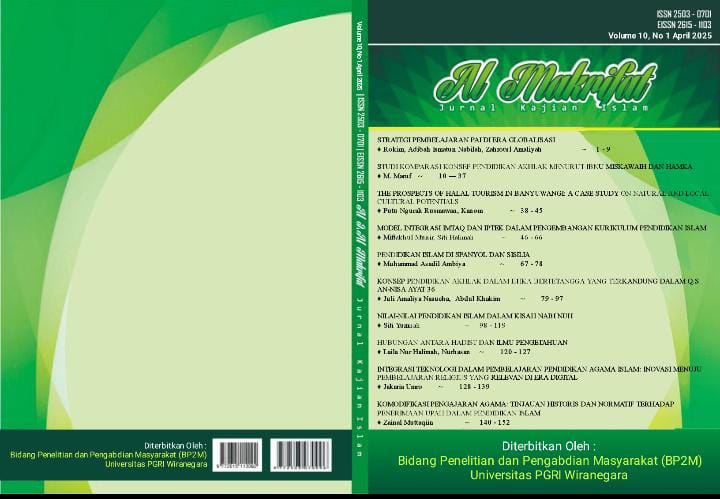THE PROSPECTS OF HALAL TOURISM IN BANYUWANGI: A CASE STUDY ON NATURAL AND LOCAL CULTURAL POTENTIALS
Abstract
This study explores the prospects of halal tourism in Banyuwangi, focusing on the integration of natural and cultural potentials as the foundation for developing Sharia compliant tourism destinations. The core issue addressed in this research is the suboptimal utilization of local values to support a sustainable halal tourism ecosystem, despite Banyuwangi’s abundant natural and cultural resources. The aim of this study is to identify and analyze the development opportunities for halal tourism in Banyuwangi through local wisdom. This qualitative research employs a case study approach, involving in-depth interviews with academics, tourism industry stakeholders, and tourists, alongside field observations and documentation. Data were analyzed using the Miles and Huberman model with validity ensured through credibility, transferability, dependability, and confirmability. Findings indicate that although Banyuwangi is not yet formally designated as a halal tourism destination, halal tourism practices have organically developed through the religious values of the Osing community and their environmental preservation efforts. These findings highlight the importance of culturally rooted approaches in developing halal tourism models, offering a framework that can be adapted by other regions with similar socio-cultural and ecological characteristics.References
Danarta, A., Pradana, M. Y. A., Abror, I., &Yahya, N. E. P. S. (2024). Encouraging religion and sustainable tourism as a conception of Indonesian halal tourism development. Revista de Gestão Social e Ambiental.
Djaha, S., Usman, A. R., &Djufri, F. (2021). Community-based tourism development as a community empowerment strategy.
Febriana, R., Basuki, A., &Saifuddin, M. (2023). Tourism destination management model in Mount Jae tourism area.
Firdausi, I., Marantika, S., Firdaus, Z. N., &Sajidah, R. (2017). Lombok: Halal tourism as a new Indonesia tourism strategy.
Hidayat, H. (2023). Development strategies for halal tourism in Indonesia through the smart tourism approach.
Lidiporu, S., &Sumarni, T. (2022). Investigating students’ high-order thinking skills in social studies using Miles &Huberman analysis
Madnasir, &Cahyani, A. B. (2024). Analysis of halal tourism development on economic development in Indonesia. KnE Social Sciences.
Mindarti, L. I., &Lazuardi, M. R. (2019). Three pillars partnership in the tourism destinations development strategy.
Pasarela, H., Soemitra, A., &Nawawi, Z. M. (2022). Halal tourism development strategy in Indonesia. Konfrontasi: JurnalKultural, EkonomidanPerubahanSosial.
Purwandani, I., & Yusuf, M. (2021). Localizing Indonesian halal tourism policy within local customs, Qanun, and marketing. Journal of Policy Research in Tourism, Leisure and Events, 16(2), 246–264.
Rianty, D., Arafah, K., &Taqwa, M. (2022). The urgency of mixed-methods studies in tourism research.
Sholehuddin, M., Munjin, M., &Adinugraha, H. H. (2021). Islamic tradition and religious culture in halal tourism: Empirical evidence from Indonesia.




